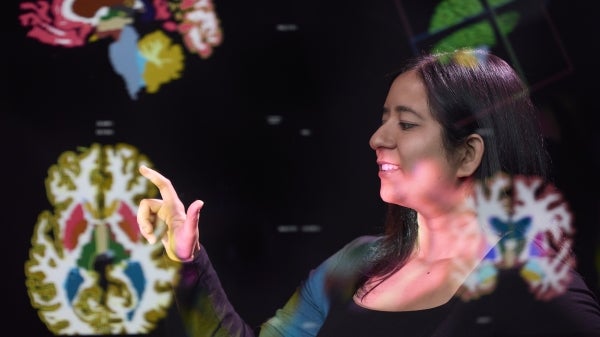Ron Askin: a dedicated, driving force behind ASU engineering schools' rise and recognition

Ron Askin
When today’s fastest growing industries increasingly rely on computing and information sciences, a school devoted to these disciplines needs a director who can keep pace. Since Ron Askin became the inaugural director of the School of Computing, Informatics, and Decision Systems Engineering (CIDSE) in 2009, he has been just what it needed.
“Ron has been on a mission to promote the research and academic programs not only in CIDSE, but also of related fields at ASU,” said Kyle Squires, dean of the Ira A. Fulton Schools of Engineering. Squires was named founding director of the School for Engineering of Matter, Transport and Energy the same year as Askin took the helm of CIDSE. “I appreciate his dedication to a vision of creating a world-class school at ASU, and I wish him the best as he moves into the next stage of his career.”
Askin has exhibited foresight throughout his stewardship of CIDSE, including adding programs that would be important to meeting the needs of industry. Master’s and doctorate programs for computer Eengineering were added in 2010, new undergraduate informatics and engineering management programs were approved for fall 2011, and the software engineering program at the Polytechnic campus was incorporated into CIDSE’s portfolio in 2014. He led the school through the Accreditation Board for Engineering and Technology, Inc. (ABET) accreditation process to ensure in-person and online students get quality education in all programs.
His goal was to strengthen the school’s core disciplines and increase the size and scope of its student body, faculty and research. For example, in the past year CIDSE has led the development of a Center for Cybersecurity and Digital Forensics under the direction of professor Gail-Joon Ahn as part of ASU’s Global Security Initiative and the Center for Assured and SCAlable Data Engineering under the direction of professor K. Selçuk Candan, both computer science faculty members.
From the first semester of the newly named school through June 2016 when he’s stepping down as director, he has no doubt accomplished what he set out to do.
A leader in his field from the start
Regents’ Professor Douglas Montgomery mentored Askin as an industrial engineering doctorate student at Georgia Institute of Technology. From the beginning, Montgomery saw Askin was exceptional in his field.
“I began working with him as a research student on his dissertation,” Montgomery said. “I always thought he had the highest ability and he didn’t disappoint me. He did a highly original and important dissertation on regression modeling.”
Since earning his doctoral degree in 1979, Askin has distinguished himself as an industrial engineering leader.
From his student years through his time as director, Askin has set himself apart with many awards and honors. He was elected Fellow of the Institute of Industrial Engineers in 1995, received the Shingo Prize for Excellence in Manufacturing Research in 1994, and won the National Science Foundation’s Presidential Young Investigator Award in 1984. This year his alma mater Lehigh University awarded him its 2016 Distinguished Alumni for Excellence in Academia.
In 2012, he served as general chair of one of the largest and most important professional society meetings in his discipline — the Institute for Operations Research and Management Science (INFORMS) annual meeting — and brought the meeting and 4,000 of its members right to ASU’s backyard at the Phoenix Convention Center.
The next year Askin became the new editor-in-chief of the premier international industrial engineering research journal, IIE Transactions, the flagship journal of the Institute of Industrial and Systems Engineers (IIE). The journal’s previous editor cited Askin’s more than 30 years of leadership in research and broad perspective and experience across the industrial engineering field.
At the same time of these personal accomplishments, Askin fostered CIDSE’s growth to be the current largest of the six Ira A. Fulton Schools of Engineering, one held in high regard both nationally and internationally.
Rapid student and faculty growth
When CIDSE was formed with the Computer Science, Computer Systems Engineering and Industrial Engineering undergraduate programs, it boasted more than 1,500 on-campus students. This number grew tremendously over the next several years as new programs were added and existing programs strengthened, nearly doubling to 2,900 students enrolled in Fall 2013, and continuing its rapid growth to nearly 4,400 students in fall 2014, and 5,100 students for fall 2015.
The student population grew in scope as well as numbers — Askin noted in 2013 that it was gratifying to see out-of-state students begin to comprise an increased fraction of the school’s enrollment. These students often mentioned they decided to attend ASU specifically because they had heard great things about CIDSE in particular.
The number of women enrolled in the undergraduate Computer Science program has also grown from fall 2009 to fall 2015. In 2009 there were 53 women enrolled, which accounted for 10.7 percent of students in the program; in 2015, 253 women were enrolled, making up 15 percent of total undergraduate computer science students.
CIDSE students have excelled, highly placing in top spots at national and international academic and entrepreneurial competitions and winning best paper awards. Students won a first place and two second place awards in the international Intel-Cornell Cup competition, and they’ve placed in top positions in other competitions, including the AVNET Tech Games and the Microsoft Imagine Cup.
Askin also attracted 38 tenure-track and lecturer faculty from highly ranked universities across the country to conduct high-impact research, which further raised the school’s profile.
These impressive faculty have won National Science Foundation (NSF) CAREER Awards, Fellow honors, and best paper awards at leading conferences, among other honors. They represent editorial staffs of research journals and conference committees and their work is published in prestigious journals. Most significantly, they’re cited by other researchers around the world.
Gaining international recognition
The school’s excellence gained attention in 2014 when the Shanghai Jiao Tong University ranked the computer science program as 22nd in the U.S. and 33rd in the world (moving up to 32nd in 2015) for its research impact based on citations, publication and awards.
“These rankings are based largely on quantitative measures, not on subjective criteria, so they are especially meaningful,” Askin said in 2014.
The Industrial Engineering program was ranked in the top 20 by the U.S. News and World Report.
High-impact programs and research
CIDSE research covers a wide range of high-impact areas, including artificial intelligence, embedded computing systems, data mining, information assurance, health informatics, educational technologies, network science, social computing and computer graphics, and Askin is proud that his school’s research is actively working to better society and enrich the human experience.
He also has been eager to encourage interdisciplinary collaborations between CIDSE faculty and ASU as well as other top schools and institutions.
Askin saw increases in research awards and proposals under his leadership. In 2009, CIDSE faculty received more than $12 million in research awards, and those numbers grew in most years, topping out at more than $17.5 million.
A strong and caring leader
Through all of CIDSE’s growth, Askin has fostered the success of students, staff and faculty as well as that of the quality of the school. Many faculty and staff remarked how he never hesitates to do what is best for all.
“He always thinks what is good for the greater community," said assistant to the director Frances Salas. “He doesn’t serve just computer science or industrial engineering or software engineering, he thinks what is good for the whole unit.”
This is apparent in the quality of his programs, the international rankings they’ve received and world-class faculty he brought in over the years.
“He cares deeply about the quality of the education that we give to our students and the opportunities that we create for them,” said industrial engineering associate professor Esma Gel.
Askin recognized his outstanding faculty, staff and students each year at CIDSE Night, which he began the first year he was director. The awards night presents faculty awards for the Best Researcher – Senior Faculty, Best Researcher – Junior Faculty, A. Alan B. Pritsker Outstanding Teacher Award and the Staff Award of Excellence. It also recognizes faculty who received Engineering Teaching Awards and years of service for faculty and staff. Students can be recognized with many awards, including Outstanding Graduating Senior, Teaching Assistant, and PhD and Dissertation Awards for each program.
In addition to being a caring leader, he has also been firm, and doesn’t tolerate inaction when he feels something needs to be done.
“I will miss Ron’s passion for doing the right thing, and his frankness when he felt efforts were not being directed appropriately,” said James Collofello, senior associate dean of Academic and Student Affairs and professor of computer science and engineering.
He can always find a solution to a problem, will listen to input of faculty and staff to make the right decisions.
“He always had a way to simplify various issues and come up with solutions that were practical and effective,” Gel said, but she also emphasizes he has always been a good listener. “He always appreciated the fact that you could make your case, and he would change his mind if you have a good argument.”
Faculty and staff will greatly miss him as a leader of their school.
“Ron was a great boss to work for six years and he always made me feel like my ideas and opinions were valued,” said Bernadine Sadauskas, assistant director of research advancement. “He led a department that continuously grew year after year, and always took what the staff has to say to heart. He will be missed and I wish him well!”
A new focus as faculty
Throughout his time as director, Askin has also taught high-level courses every semester, and next semester he’ll step back into a faculty role.
He is looking forward to spending more time working closely with his students to solve problems in logistics and supply chain engineering.
“The availability of data and computational power create new opportunities for improving system efficiency and customer service,” Askin said. “I am looking forward to exploring new approaches for leveraging these developments in information and communication technology.”
More Science and technology

Podcast explores the future in a rapidly evolving world
What will it mean to be human in the future? Who owns data and who owns us? Can machines think?These are some of the questions…

New NIH-funded program will train ASU students for the future of AI-powered medicine
The medical sector is increasingly exploring the use of artificial intelligence, or AI, to make health care more affordable and…

Cosmic clues: Metal-poor regions unveil potential method for galaxy growth
For decades, astronomers have analyzed data from space and ground telescopes to learn more about galaxies in the universe.…